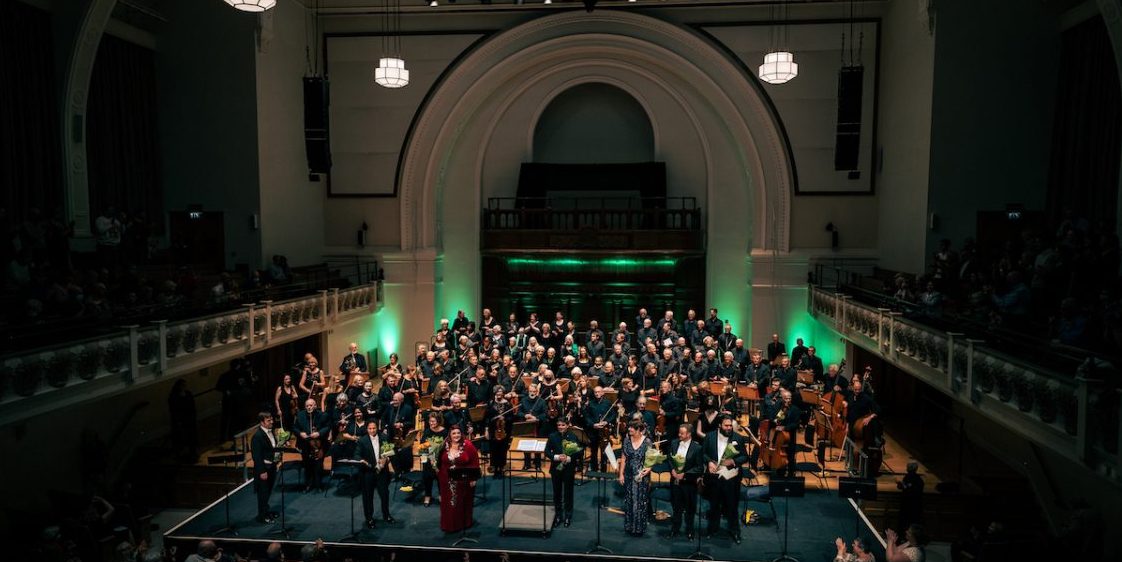With ‘Six’ and ‘The Mirror and the Light’ running in the West End it is clear that our appetite the Tudors continues unabated; but this is an obsession that is more widely shared and goes further back than you might think. A remarkable performance at Cadogan Hall from the Chelsea Opera Group of Donizetti’s ‘Roberto Devereux’ reminds us the nineteenth century was equally absorbed in the English 16th century, though perhaps for slightly different reasons from our own. Written in the late 1830s at the height of the composer’s powers and fame, this work was the third (after ‘Anna Bolena’ and ‘Maria Stuarda’) to explore the romantic and political machinations around queens from this era. The fact that England was a Protestant country gave the composer more freedom from censorship in the Catholic countries where his works would be performed, and the conflicts between love and duty, sovereign and subject, female power and predominant patriarchal systems played entirely to his strengths.
Compared to the gore-drenched melodrama of ‘Lucia di Lammermoor’, this is a more restrained and concise work, designated a ‘drama of the emotions’, and limited to four characters, Queen Elizabeth, her last favourite the Earl of Essex, and a second couple, the Duke and Duchess of Nottingham, with the latter the real love interest for Essex, which is his fatal undoing with the Queen. Britten was later to explore the same territory in ‘Gloriana’ but here the focus is more on the personal jealousies and rivalries of the powerful and how they affect political outcomes. There are a few lesser, ‘comprimario’ roles to help move the plot along, and a chorus of lords and ladies to embody the Queen’s court.
A tighter focus than usual places the burden of success mainly on the four lead roles, the orchestra, and the conductor’s coordination of the whole. There are many potentially awkward transitions between and within arias, and the music is consistently demanding of technique. In each of these respects the results were outstanding. From the overture onwards we knew we were in for a treat: what could easily be a pedestrian ‘pot pourri’ of tunes was shaped incisively by the conductor into a meaningful evolution and interweaving of textures setting up the emotional palette of what was to come.
One of the reasons why this piece is so rarely performed rests with the ‘coloratura’ demands on the soprano playing Queen Elizabeth. Helena Dix rose superbly to the challenge, particularly in the relentlessly wrathful second and third acts where her top notes and chest voice expressed intimidating authority. But aside from regal command she also found reserves of rare tonal delicacy and poignant loneliness to flesh out the humanity of the role. She owned the character. Alongside her as Essex, Eleazar Rodriguez, had only joined the cast a few days before, but their chemistry was excellent; and he, in turn, delivered his bravura moments with aplomb and his episodes of melancholy, especially in the prison scene, with plausible intensity.
The second couple were no less excellent vocally, and in some ways had to cover a wider spectrum of emotions. It is never easy to play a good character who lacks agency, but Catherine Carby conveyed the sincerity and anguish of Duchess Sara with passion and psychological credibility, and Julian Van Mellaerts, switched from joviality to rage with skill, suggesting how powerful he will be in future Verdi roles revolving around betrayal. They were the glue that held the production together.
This was one of those evenings where the skill and persona of the conductor lifted everyone’s level. Remarkable in one who has so recently transitioned from the keyboard to the podium, Gary Matthewman was fully on top of the demands of the score, deftly supporting and coordinating his soloists (with no monitors to help!), while keeping the chorus on their toes, and alternately reining in or unleashing his orchestral forces to preserve a proper balance. The Chelsea Opera Group has helped launch many a distinguished conducting career and their talent-spotting skills show no signs of waning.
A short review cannot do justice to the range of detailed delights from this unjustly underperformed work (for example the fine flute solos of Mary Ann Kernan and the vocal contributions of Steven Aviss, Edward Jowle and James Platt), but the unrestrained enthusiasm of the audience during and afterwards was testament to the fact that we were part of a truly special occasion.

